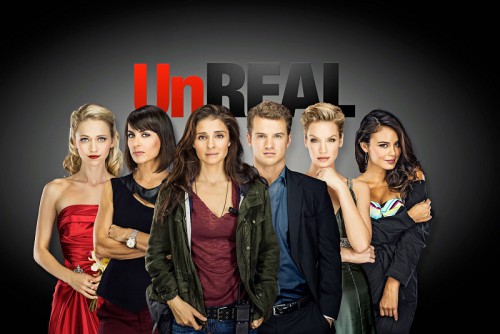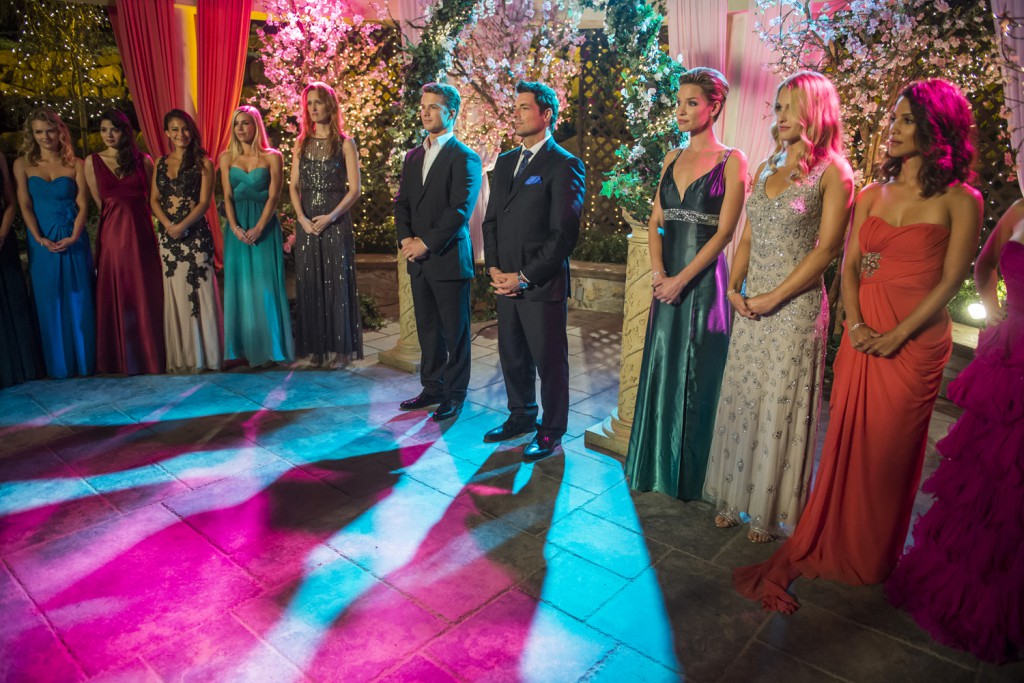
This is part 1 of a multipost series on UnREAL, a serial drama on Lifetime that is returning for its second season on June 6. Spoiler alert, but you’ve had a year to enjoy this one…

I am that guy who hates reality shows and wants you to know about it—out of sincere concern for the genre’s effect on intelligence and a subconscious need to broadcast my superiority (eg, this sentence). I would like to tell you, therefore, that the serial drama UnREAL, about the production of a fictional reality show, is appealing because it holds a mirror to bad art. It does, of course, but the show also holds a mirror to the viewer and is thereby likely to be effective at ruining practically anyone’s sense of moral superiority to reality shows, their contestants and creators, and their viewers.
UnREAL depicts the on-and-off-camera drama surrounding Everlasting, which is The Bachelor with a noninfringing title. Rachel Goldberg is a producer responsible for, well, “producing” (a word that takes on an increasingly layered and sinister meaning) the show’s “suitor” and a group of contestants. The suitor, for whom beautiful young women are competing, is Adam Cromwell, a disinherited member of the British aristocracy who wants the notoriety from the show to rehabilitate his public image. The primary contestants are Grace, the Latin American model who is the favorite to win; Anna, a smart and prim lawyer; and Faith, a Mississippi girl intended to appeal to flyover state viewers. The show is run by Quinn, the executive producer of both the show and her subordinates (especially Rachel), and Chet, the cocaine-fueled creator of the show.
On the surface, UnREAL displays the widely-acknowledged, off-camera scripting of reality TV. Quinn pays the producers cash bonuses for breakdowns, nudity, and fights; she decides who is and isn’t a “wifey,” contradicting the illusion that the suitor and contestants are in control of the show’s outcome. Quinn, in particular, displays nauseating cynicism, eg, the two black girls are declared not wifey material from the first episode, and the producers convince one of them to adopt a sassy + aggressive stereotype as her persona. Indeed, the contestants, over the course of the show, reinforce the character profiles that Quinn and the other producers foist upon them week by week.
This sort of manipulation is expected when one depicts reality TV, but UnREAL takes it to dizzying heights. Several times, a well-placed conversation with Rachel leads to a feminist-nightmare catfight. Early in the season, Anna’s father dies but the showrunners keep the news from her. Rachel, needing a cash bonus to pay overdue rent, tells Anna about her father’s death, triggering a flight from the show and an angry tirade when she does return. An ambulance waits in the driveway while she fumes at the show for withholding information and then taking advantage of her. The ambulance’s purpose is clear when Rachel edits the footage to recast the story as an unprovoked mental breakdown. Rachel steers each contestant toward an outcome she wants, and she simultaneously falls for and then away from Adam, the suitor. When Jeremy, her good-guy former boyfriend, tells her that she enjoys the drama in her life and on the show, we can’t help but agree with him.
Meanwhile, Quinn has seemingly no qualms about keeping Rachel on the show via blackmail. An on-camera, drunken meltdown in the previous season left Rachel in debt to the production company. Quinn can but refuses to discharge the debt. But Quinn is not exactly a free spirit, since she is in a destructive, unequal relationship with Chet. Chet is wealthy from stealing Everlasting from Quinn—relegating her to an executive producer who is an employee rather than a partner with equity in the venture—and remains married despite an eight-year affair with Quinn. Chet seems like a loveable oaf until about the middle of the season, when he and Quinn vie for equity in the show and then a key relationship they have with a network executive. This storyline culminates in a live-TV wedding completely orchestrated by Quinn and Rachel that restores both of their careers. Even so, they are stuck with another season of UnREAL rather than the woman-first shows they would prefer.
The most important manipulation, though, is on the audience. Lifetime has created a reality show for people who hate (and love) reality shows. I can watch and be horrified by the fictional chaos, content that my tastes remain unspoiled. But after about seven episodes, my wife and I found ourselves having the same conversations that reality TV fans have with each other:
“He’s going for Anna. She’s the smart one.”
“No, he wants Grace. She’s hot and doesn’t care if he fools around after they get married.”
Yes, UnREAL reminds us that reality TV is an artifice, but it also informs us (if we don’t know already) why the genre is so appealing. We want to see the sex, sleaze, bickering, braggadocio, anxiety, and lying that reality TV contestants engage in to win. We don’t realize or don’t care that the whole thing is scripted and honed by creative teams who are skilled in the selection and manipulation of contestants. The title of UnREAL is a blunt statement that reality TV producers actively shape the shows we consume as somehow closer to reality than scripted TV.
Just as reality TV itself is a mirror for all of us at our worst and most greedy, though, UnREAL asks how much control we really have over our own lives. Most of the manipulation in UnREAL is shown to be intentional but unseen by the target, suggesting that the forces influencing our lives—often without our knowledge—are not accidental or incidental. In prior decades, a show about reality TV would end its first season with a courageous producer successfully fighting for decency in the genre. Season two would be a narrative about the creative challenges of a better sort of reality TV and the continued conflict with commercial forces that want to betray the original vision. The series finale would be about the courageous producer winning an Emmy and inaugurating a new, positive wave of reality TV. It would, like every idiot-dad–driven sitcom, focus on how the main character overcomes adversity.

UnREAL takes the opposite approach, ending with a blunt, somewhat hopeless conversation between Quinn and Rachel. Both are well-placed to succeed and profit from Everlasting, but it will be the same show. After all the truly awful things they did during the season, they face no negative consequences; despite their attempts to, at times, do the right thing, they are not better people.
With these confirmed antiheroes, the viewer might be tempted to only ponder big, unseen forces, e.g., immoral businesses, invasive governments, social media trolls, abusive churches, corrupt pastors. More profoundly and subtly, though, the show illuminates the inner manipulations we suffer, eg, physical sickness, black-flag depression, irrepressible anxiety, unexplained pain. On most reality TV, we assume that contestants are acting and scripted—but the outrageous behavior is different from reality in degree, not kind. All Rachel and Quinn and the other Everlasting producers really do is find weaknesses to magnify. Moreover, the weaknesses that are magnified are not just interpersonal flaws; they actively use bipolar disorder, mourning, medication mismanagement, and domestic violence to make each show compelling. How far would someone have to push any of us to become a clip-worthy Everlasting contestant?
As I write this, it is 5:13 a.m., and I have been up all night. I’ve had a migraine since about 10 a.m. yesterday that never really went away. At about 3 a.m. this morning, I got some relief—but the overlapping triptans and NSAIDs conspired to keep me fully awake. My plans for work today are shot, and I’m debating just how much sleep I can manage and when. This is purely my body acting out of control, and it is affecting my work productivity, family life, and emotional health. What if the pain gets worse? Will I need medical care? I don’t know. What if someone was using this against me? I would be nonfunctional and an emotional wreck.
I am grateful, in this moment, for quick and easy access to healthcare that minimizes the burden of my recurring migraines, an understanding boss who won’t think less of me when I come back to work on Monday, a strong and supportive wife who will advise and console me throughout the day, and prepaid daycare so we can have some freedom from toddler hell this morning. My thankfulness is, however, tinged with anxiety because of the hours I spent watching UnREAL. Will these gifts be withdrawn? Will someone manipulate me against my interests to serve theirs? I don’t know.
Thankfully, God is not a reality show producer. Jesus meets us amid the manipulation we face in the world around us. UnREAL is helpful in that it reminds us of our need for help and our inability to achieve peace on our own. It makes believers receptive to surrendering their will in prayer to God. Also, it’s damn entertaining–heaven help me!
NB: My wife was supremely helpful in getting me started on the series. Also, for those of you who have already seen UnREAL, I will get to Mary, I promise.
Image credits: Featured image by Flickr user Dean (leu). Other images are for marketing (fair use).

COMMENTS
Leave a Reply












